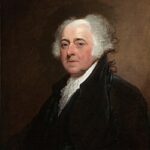President John Adams faced a crushing defeat in the 1800 election. Thomas Jefferson’s Democratic-Republicans had swept both the presidency and Congress. Adams knew his Federalist Party’s influence would vanish completely. ⚖️
The Midnight Judges Decision
On February 27, 1801, Congress passed the Judiciary Act of 1801. The law created sixteen new federal circuit judgeships. Adams worked frantically to fill these positions before leaving office. He appointed fifty-eight Federalist judges during his final weeks as president.
Racing Against Time
Adams signed judicial commissions until his last night in office. Secretary of State John Marshall worked alongside him. They processed appointments until midnight on March 3, 1801. Some commissions remained undelivered when Jefferson took office the next morning.
Strategic Court Packing
The midnight judges strategy aimed to preserve Federalist control of the judiciary. Adams appointed only loyal party members to these lifetime positions. ⚠️ This blatant partisan move violated the spirit of peaceful power transitions. The appointments would influence federal law for decades to come.
Impact:
Jefferson discovered the undelivered commissions upon taking office. His fury over the midnight judges scheme shaped his entire presidency. The new president ordered Secretary of State James Madison to withhold remaining commissions. 🔥
Constitutional Crisis Emerges
William Marbury sued Madison for his withheld commission. The case reached the Supreme Court in 1803. Chief Justice John Marshall faced an impossible political situation. He had actually signed many of the original commissions as Adams’ Secretary of State.
Marbury v. Madison Transforms America
Marshall’s decision in Marbury v. Madison established judicial review forever. The Court gained power to declare laws unconstitutional. This precedent transformed the balance of American government. Marshall cleverly avoided immediate political conflict while expanding judicial authority.
Long-term Political Consequences
The midnight judges controversy poisoned relations between Federalists and Republicans. Jefferson’s party repealed the Judiciary Act in 1802. They eliminated most of Adams’ new judgeships entirely. 📊 This partisan warfare established dangerous precedents for future court battles. Modern debates over court packing trace directly back to Adams’ controversial decision.
